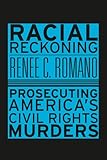Racial Reckoning : Prosecuting America’s Civil Rights Murders / Renee C. Romano.
Material type: TextPublisher: Cambridge, MA : Harvard University Press, [2014]Copyright date: ©2014Edition: Pilot project. eBook available to selected US libraries onlyDescription: 1 online resource (256 p.) : 16 halftonesContent type:
TextPublisher: Cambridge, MA : Harvard University Press, [2014]Copyright date: ©2014Edition: Pilot project. eBook available to selected US libraries onlyDescription: 1 online resource (256 p.) : 16 halftonesContent type: - 9780674976030
- 9780674736177
- 345.7302523
- KF221.M8 .R66 2014
- online - DeGruyter
| Item type | Current library | Call number | URL | Status | Notes | Barcode | |
|---|---|---|---|---|---|---|---|
 eBook
eBook
|
Biblioteca "Angelicum" Pont. Univ. S.Tommaso d'Aquino Nuvola online | online - DeGruyter (Browse shelf(Opens below)) | Online access | Not for loan (Accesso limitato) | Accesso per gli utenti autorizzati / Access for authorized users | (dgr)9780674736177 |
Frontmatter -- Contents -- Introduction: Exhuming the Past -- 1. Crimes and Complicity during the Civil Rights Era -- 2. “Jim Crow” Justice -- 3. Reopening Civil Rights–Era Murder Cases -- 4. Civil Rights Crimes in the Courtroom -- 5. Civil Rights Trials and Narratives of Redemption -- 6. From Legal Justice to Social Justice -- Conclusion: “We Are All Mississippians” -- Notes -- Acknowledgments -- Index
restricted access online access with authorization star
http://purl.org/coar/access_right/c_16ec
Few whites who violently resisted the civil rights struggle were charged with crimes in the 1950s and 1960s. But the tide of a long-deferred justice began to change in 1994, when a Mississippi jury convicted Byron De La Beckwith for the 1963 murder of Medgar Evers. Since then, more than one hundred murder cases have been reopened, resulting in more than a dozen trials. But how much did these public trials contribute to a public reckoning with America’s racist past? Racial Reckoning investigates that question, along with the political pressures and cultural forces that compelled the legal system to revisit these decades-old crimes. Renee C. Romano brings readers into the courthouse for the trials of the civil rights era’s most infamous killings, including the Birmingham church bombing and the triple murder of Andrew Goodman, James Chaney, and Mickey Schwerner. The activists who succeeded in reopening these cases hoped that bringing those responsible to justice would serve to highlight the state-sanctioned racism that had condoned the killings and the lingering effects of racial violence. Courtroom procedures, however, worked against a deeper exploration of the state’s complicity in murder or a full accounting of racial injustices, past or present. Yet the media and a new generation of white southerners—a different breed from the dying Klansmen on trial—saw the convictions as proof of the politically rehabilitated South and stamped “case closed” on America’s legacy of violent racism. Romano shows why addressing the nation’s troubled racial past will require more than legal justice.
Mode of access: Internet via World Wide Web.
In English.
Description based on online resource; title from PDF title page (publisher's Web site, viewed 08. Aug 2023)


